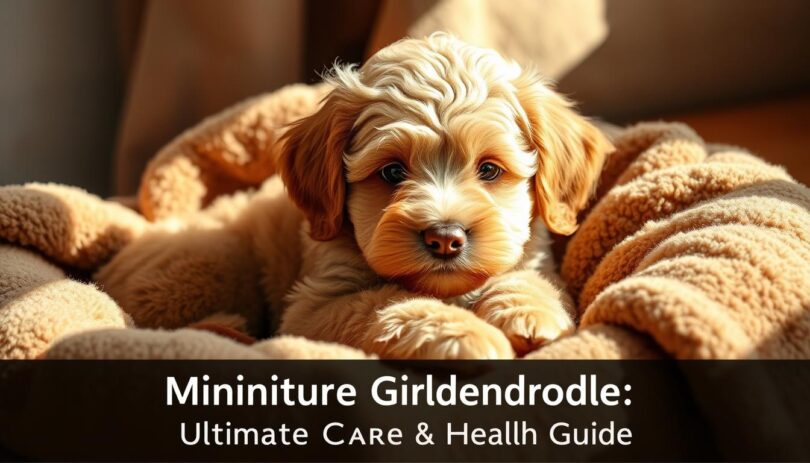Are you considering bringing a Miniature Goldendoodle into your family? This guide is here to help you every step of the way. A cross between a Golden Retriever and a Miniature Poodle, the Miniature Goldendoodle has quickly become a favorite for many dog lovers. Known for their intelligent, friendly, and hypoallergenic traits, this breed is a perfect companion for many families.
In this comprehensive guide, we’ll cover everything you need to know about caring for your Miniature Goldendoodle. From nutrition and training to health checks and finding the right breeder, we’ve got you covered. Whether you’re a first-time dog owner or a seasoned pet parent, this guide will provide you with expert-backed advice to ensure your furry friend lives their best life.
With their playful yet gentle nature, Miniature Goldendoodles bring joy and love into any home. Let’s dive into the details you need to know to give your dog the care they deserve.
Understanding the Miniature Goldendoodle Breed
The Miniature Goldendoodle has become a beloved choice for many dog enthusiasts. This unique cross between a Miniature Poodle and a Golden Retriever was first introduced in the mid-1990s. Breeders aimed to create a dog that combines the low-shedding, intelligent nature of a Poodle with the friendly, affectionate traits of a Golden Retriever. This blend has resulted in a breed known for its teddy-bear-like appearance and endearing personality.
History and Origin
Originating in the mid-1990s, the Miniature Goldendoodle was bred to be a companion dog. The Golden Retriever contributes a gentle and sociable nature, while the Miniature Poodle adds intelligence and a low-shedding coat. This cross quickly gained popularity due to its hypoallergenic traits and loving temperament.
Key Physical and Temperament Traits
Miniature Goldendoodles typically weigh between 15 to 35 pounds and stand 13 to 30 inches tall. Their coat varies from wavy to curly, requiring regular grooming. Known for expressive eyes and a graceful gait, they captivate with their charm.
In terms of temperament, they are highly intelligent and eager to please, making training straightforward. Their friendly and social nature makes them excellent family pets. Playful yet gentle, they adapt well to various living situations, provided they receive adequate exercise and attention.
Their intelligence and sociability stem from their parent breeds, ensuring they thrive in active families. With proper care, Miniature Goldendoodles bring joy and companionship, making them an ideal choice for many.
Miniature Goldendoodle Care Essentials
Providing the right care for your Miniature Goldendoodle ensures they lead a happy and healthy life. Establishing a daily routine is key to their well-being.
Daily Routine and Exercise
A daily routine should include walks and playtime to keep your dog happy. Miniature Goldendoodles need 20 to 30 minutes of exercise daily. This helps balance their energy levels and keeps them active.
Regular feeding times and mental stimulation are also important. A structured schedule prevents boredom and anxiety, ensuring your dog stays engaged and content.
Preventative Health Practices
Regular vet visits and vaccinations are vital for maintaining your dog’s health. These practices help prevent common issues like hip dysplasia and patella luxation.
Proper nutrition plays a significant role alongside exercise. Ensuring your dog gets a balanced diet supports their overall health and vitality.
By integrating these care routines into your family schedule, you can ensure your Miniature Goldendoodle enjoys a long, healthy life filled with joy and companionship.
Health and Nutrition for Your Miniature Goldendoodle
Keeping your Miniature Goldendoodle healthy requires attention to both diet and regular care. A well-balanced diet and preventive health measures can significantly improve their quality of life.
Balanced Diet Strategies
A high-quality diet is essential for your Miniature Goldendoodle’s health. Look for dog food with 2-3 meat proteins, 10% fat, and less than 30% carbohydrates. Portion control is crucial to maintain their ideal weight, typically between 15 to 35 pounds.
Consider adding supplements like glucosamine for joint health and omega-3 oils for a shiny coat. As your dog ages, their dietary needs may change, so consult your vet for adjustments.
Common Health Concerns and Preventive Care
Miniature Goldendoodles can face issues like hip dysplasia and eye problems. Regular vet visits and health screenings can catch these early, improving outcomes. Keep your dog active with 20-30 minutes of exercise daily to support joint health.
A balanced diet combined with regular exercise promotes longevity and overall well-being. By focusing on nutrition and preventive care, you can help your Miniature Goldendoodle live a happy, healthy life.
Training and Socialization Strategies
Training your mini goldendoodle is a rewarding journey that strengthens your bond and helps them become a well-behaved companion. With their intelligence and eager-to-please nature, they respond exceptionally well to positive reinforcement techniques.
Basic Commands and Obedience Techniques
Start with simple commands like “sit,” “stay,” and “come.” Use high-value treats and praise to encourage good behavior. Short, engaging sessions of 5-10 minutes work best, as they keep your dog focused and excited to learn.
Consistency is key. Set aside time each day for training to build a strong foundation. This structured approach helps your mini goldendoodle understand expectations and reduces confusion.
Encouraging Social Play and Interaction
Socialization is crucial, especially during the puppy stage. Introduce your dog to various environments, people, and other animals to foster confidence and calmness in new situations.
Incorporate interactive play, such as fetch or puzzle toys, to challenge their mind and reinforce learning. These activities not only build confidence but also deepen your bond with your dog.
Addressing common challenges, like jumping or barking, can be done through patient training and redirecting their attention. With time and effort, your mini goldendoodle will grow into a well-adjusted and obedient pet.
Choosing a Reputable Mini Goldendoodle Breeder
When bringing a mini goldendoodle into your family, selecting a trustworthy breeder is crucial. This ensures your new companion is healthy and well-socialized. A reputable breeder prioritizes both the health and temperament of their puppies, making them a great choice for families.
Evaluating Breeder Credentials and Health Testing
A good breeder should be accredited by organizations like the Goldendoodle Association of North America. They should provide health clearances for issues like hip dysplasia and eye problems. Always ask for written health records and genetic histories to ensure transparency.
Questions to Ask and Red Flags
Visit the breeder to see the living conditions and meet the mother. Be wary of poor conditions or lack of health certifications. A reputable breeder will happily answer questions and provide necessary documentation, ensuring you get a healthy puppy.
Grooming and Coat Maintenance
Grooming is essential for keeping your mini goldendoodle clean and comfortable. Their coat requires regular attention to prevent matting and tangling.
Brushing, Bathing, and Trimming Tips
Start with daily brushing to keep their coat healthy. Use a high-quality brush to gently work through any tangles. Bathing should happen every 6-8 weeks, followed by a blow dry to prevent moisture buildup. Trimming is needed every 6-8 weeks to keep their coat neat and manageable.
Managing Shedding and Preserving Furnishings
While mini goldendoodles shed very little, regular grooming helps reduce loose hair. Use a deshedding tool weekly and vacuum frequently to keep your home tidy. For their facial furnishings, check daily for ticks and mats, especially in shaggy areas.
Proper grooming not only keeps your dog looking good but also ensures their overall health and comfort. Remember, low shedding doesn’t mean low maintenance—regular care is still necessary.
Exercise, Play, and Mental Stimulation
Ensuring your mini goldendoodle stays active and engaged is crucial for their overall well-being. A combination of structured exercise and stimulating play helps maintain their physical health and mental sharpness.
Structured Activity Routines
Mini goldendoodles benefit from a mix of walks and playtime. Aim for at least 20-30 minutes of exercise daily. This can include brisk walks and interactive games like fetch or tug-of-war. Structured routines help balance their energy levels and keep them mentally engaged.
Interactive Games for Brain Stimulation
Engage your dog with puzzle toys and scent games to challenge their mind. These activities not only prevent boredom but also strengthen your bond. For indoor days, try hide-and-seek or stair climbing to keep them active and entertained.
Regular physical activity and mental stimulation are vital for a happy, healthy mini goldendoodle. For more tips on exercise and play, visit our complete guide to mini goldendoodle care.
Creating a Nurturing Home Environment
Building a warm and welcoming home for your mini goldendoodle is key to their happiness and your family’s harmony. By integrating your dog into daily routines and creating a safe space, you foster a loving atmosphere that supports their development.
Fostering Family Bonding and Socialization
Start by involving your mini goldendoodle in family activities. Whether it’s a walk or playtime, these moments strengthen your bond and help them feel included. Consistent routines, like set times for meals and play, provide stability and comfort.
Bonding activities such as family walks, interactive games, and quiet cuddle sessions are great ways to deepen your connection. These interactions not only entertain your dog but also reinforce training and social skills.
Socialization is crucial, especially during puppyhood. Introduce your dog to new people, pets, and environments to build confidence. Positive interactions early on help shape a well-adjusted personality.
Setting clear boundaries ensures comfort for both your dog and family. Designate a quiet area for rest and ensure everyone understands respectful interaction. This balance supports a harmonious home environment.
Creating a safe, stimulating space is vital. Provide toys, comfy beds, and safe zones where your dog can relax. Regular grooming sessions, like brushing, not only maintain their coat but also offer quiet time for bonding.
By focusing on these elements, you create a nurturing home where your mini goldendoodle thrives. A loving environment, combined with proper care, helps your dog grow into a happy, well-adjusted companion.
Final Reflections on Raising a Miniature Goldendoodle
Raising a mini goldendoodle is a rewarding journey that brings joy and companionship into your life. As outlined in this guide, providing the right care involves a blend of proper nutrition, regular exercise, and consistent training. These elements work together to ensure your dog leads a healthy, happy life.
The unique traits of the mini goldendoodle make them an ideal companion. Their intelligence, friendly nature, and low-shedding coat are just a few reasons why they’re beloved by many families. By establishing routines and prioritizing health care, you create a stable environment that supports their well-being.
When selecting a breeder, it’s crucial to choose one who prioritizes health and temperament. A reputable breeder ensures your puppy is well-socialized and healthy, setting the foundation for a positive relationship with your new pet.
Remember, thoughtful care and attention to detail will help your mini goldendoodle thrive. With the right approach, you’ll enjoy a lifelong friendship filled with love and companionship. Embrace the journey and give your dog the care they deserve for a happy, well-adjusted life.
FAQ
What health concerns should I be aware of in Mini Goldendoodles?
Mini Goldendoodles can be prone to health issues such as hip dysplasia and certain eye conditions. Regular veterinary check-ups and a balanced diet are essential for maintaining their health.
How do I find a reputable breeder for a Mini Goldendoodle?
Research breeders thoroughly, ensuring they conduct health testing on parent breeds and prioritize transparency. Ask for references and visit their facility if possible to ensure ethical practices.
What grooming needs do Mini Goldendoodles have?
Regular brushing is crucial to prevent matting. Bathing every 2-3 weeks and occasional trimming will help maintain their coat. Consistent grooming helps reduce shedding and keeps their coat healthy.
How should I approach training my Mini Goldendoodle?
Use positive reinforcement techniques like treats and praise. Start with basic commands and gradually introduce more complex tasks. Consistency and patience are key to effective training.










Leave a Comment